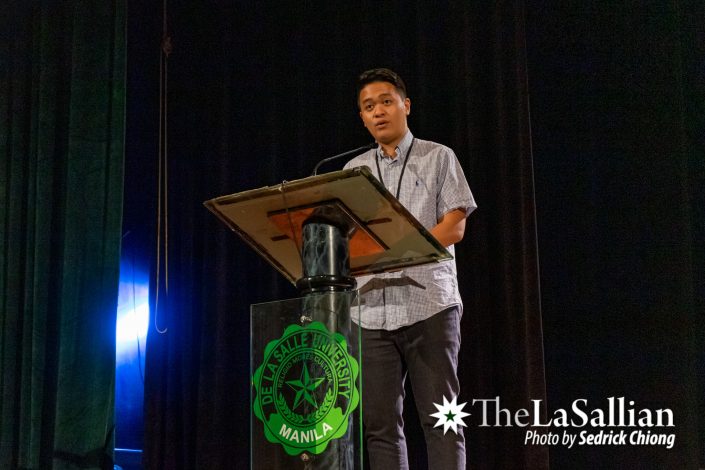As part of the University Student Government’s (USG) Safe Spaces initiative, USG President Lance Dela Cruz held a press conference last October 26 at the USG Session Hall located on the third floor of Br. Connon Hall to give insights and lay down further details on the ongoing plans for the initiative’s Mental Health Task Force.
The launch of recruitment efforts for the task force came only a few days after successful deliberation in the USG’s Legislative Assembly last October 16. Online and in-campus recruitment began last October 21 and will end on October 28.
Preparation efforts
Drawing parallels to other Lasallian volunteer groups such as the Student Discipline and Formation Office’s Paragons, the Mental Health Task Force is structured to eventually function as a “student-led” wing of the Office of Counselling and Career Services (OCCS). Dela Cruz clarified that the group will only be identified as a task force while it is under the Office of the President (OPRES). Once the USG’s proposal to the Student Affairs Council is finalized, the task force will be formally placed under the OCCS as its student wing.
To make sure that the task force is staffed with qualified volunteers, applicants are required to undergo a rigorous two-stage screening process. The initial screening will be conducted by the OPRES, followed by a second screening by the OCCS to ensure the applicants are fit for the task.
A number of considerations were also outlined as criteria as well. Those looking to join must maintain a minimum Cumulative Grade Point Average of 2.5 which will be monitored every term, besides having previous leadership and organizational experiences. Advocates will also be barred from taking on major responsibilities in other organizations and must have at least one academic year remaining in the University.
Accepted volunteers can expect benefits enjoyed by fellow volunteer groups, including advanced enlistment. Constant support will also be provided by the OCCS to keep the branch in top condition. “The application [process] is stringent and it is stringent for a reason,” explained Dela Cruz, citing the need to maintain the standards of the volunteer group.

Establishment
According to Dela Cruz, the need for a Mental Health Task Force arose from the lack of advocacy-oriented organizations that catered to students experiencing mental health issues.
Dela Cruz assured that student volunteers will not handle cases by themselves but will rather help refer cases to the OCCS. He highlighted the need of a safe space for students to talk to their peers without fear of authority or discrimination, “Mas madaling lapitan yung mga peer counselor, kaysa sa mga counselors themselves, and even [the] OCCS recognizes that.”
(Peer counselors are easier to approach than professional counselors.)
Should the group formally become part of the OCCS, it will enjoy administration support. “Hindi sila mahihirapan sa funding, hindi sila mahihirapan sa activities because it will be in line with what the University aims to have in terms of mental health,” assured Dela Cruz.
(They will not have trouble with funding, they will not have trouble with activities)
Steps for the LGBTQ+ advocacy
Similarly, Dela Cruz also highlighted the USG’s LGBTQ+ advocacy organization being set up in conjunction with the Mental Health Task Force.
In contrast to the Mental Health Task Force, Dela Cruz explained that the LGBTQ+ advocacy organization will be under the Council of Student Organizations (CSO). Volunteers under the group will be trained by figures from groups outside the University that are heavily involved in advocating for Sexual Orientation and Gender Identity and Expression nationwide.
The USG President clarified that the USG originally intended to help accredit the unofficial LGBTQ+ organization PARADA, but the small number of remaining members presented a major obstacle. “When we contacted them, it turns out most of them have already graduated and those that are here have only a term left and none of them were willing to continue the organization,” Dela Cruz narrated.
Nevertheless, Dela Cruz expressed his hope that both advocacy groups would be institutionalized within the academic year before the next batch of USG officers takes over, “We recognize naman na as the administrations change in the USG, so do the priorities.”
